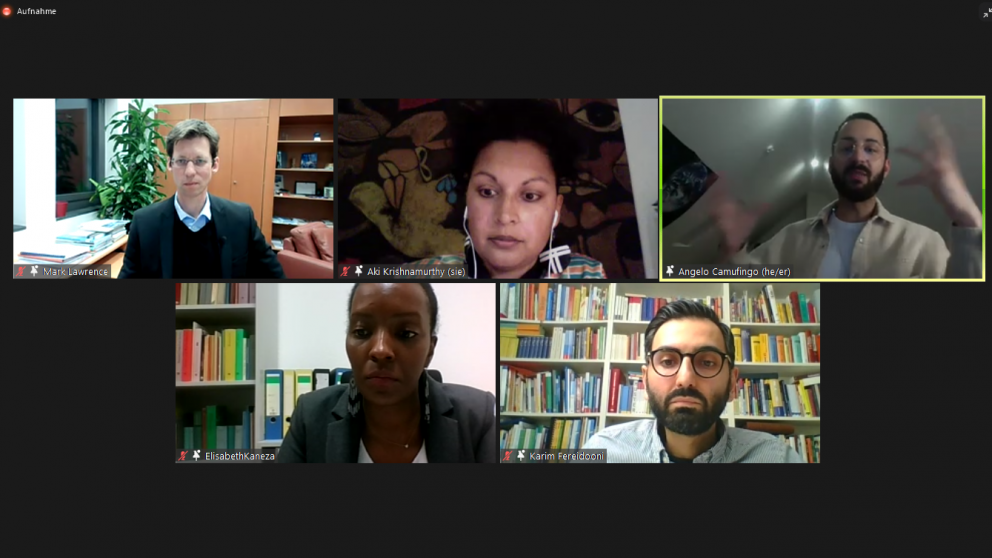Creating Awareness, Dismantling Barriers: What Scientific Institutions Can Do to Combat Racism
03.03.2021
The protests against racist police violence in the USA have sparked a new debate on racism. In Germany, too, racist views and structures permeate public life, including the academic system, criticized experts on racism during an online panel discussion organized by the University of Potsdam and the Institute for Advanced Sustainability Studies (IASS).

The discussion focused on several core questions: Is there a broad awareness of issues relating to race and ethnicity in Germany? To what extent does science reproduce structural racism and racist language and discrimination? What can be done to encourage more people of colour to study at university and pursue careers in research? The panel comprised Aki Krishnamurthy (Anti-racism and Empowerment Officer at Alice Salomon University of Applied Sciences Berlin, empowerment trainer, theatre and dance instructor), Karim Fereidooni (Junior Professor of Social Science Education at Ruhr-University, Bochum), Elisabeth Kaneza (PhD student, University of Potsdam, founder of the Kaneza Foundation for Dialogue & Empowerment) and Angelo Camufingo (Master's student and student council officer, University of Potsdam, trainer and speaker on racism and education). IASS Scientific Director Mark Lawrence moderated the panel discussion.
Structural discrimination is still frequently unacknowledged
The participants in the panel discussion agreed that a broad awareness of the issues around racial discrimination is lacking in mainstream German society. "On the one hand, there are those who have experienced or are experiencing racism and who know what racism is; but the dominant discourse is that of the mainstream, which does not know what racism is and has not experienced racism," explained Elisabeth Kaneza. The very fact that various groups face structural discrimination in Germany is not broadly acknowledged, she said, and socio-political measures are needed to counteract discrimination. The adoption of a uniform definition of racism and racial discrimination in Germany could help to change this. Currently, policymakers rely on definitions imported from the USA and the United Kingdom, even in such key documents as the Action Plan against Racism (2017).
Intersecting forms of discrimination
Aki Krishnamurthy reported that she is contacted regularly by students affected by racism. In her view, Black students and students of colour face discrimination in gaining access to higher education and subsequently in their careers. "These students face numerous barriers in student life and university seminars: How are decisions made in seminars? Who can undertake an unpaid internship? Who can join a particular working group? All these issues are linked to students' living conditions." In Krishnamurthy's experience, racism must be approached from an intersectional perspective in which different categories of discrimination – race, class and gender, for example – overlap and intersect.
Non-Western voices and knowledge are marginalized
Angelo Camufingo drew attention to the long-standing marginalization of non-Western knowledge at German universities: Science is often mistakenly considered an objective means of generating knowledge, although it has been shaped throughout history by the exclusion of non-Western knowledge. Researchers must engage more closely with this history, "because with every extermination, with every genocide, with every murder, we not only exterminate a person or a people but their knowledge as well". This makes it all the more important to "decolonize" the curricula and to give all people the opportunity to produce knowledge in future.
Academic experts on racism frequently perceived as victims
Karim Fereidooni addressed the need for research on racism to be properly recognized as a scientific endeavour. Too often, he explained, researchers on race are perceived as victims of racism rather than experts. Fereidooni reported that Q&A sessions following his lectures, which explore critical perspectives on racism, are often reminiscent of "pub debates" – even renowned scholars find it difficult to talk about racism from an analytical perspective and become defensive instead. "And these are people who say of themselves that they have nothing to do with racism. People who say that racism is an issue for the AfD and the NPD and who claim that they have never been racist in their lives". Fereidooni expressed hope that more researchers would take up the challenge of exploring how racism permeates bodies of knowledge relevant to their research. This commitment must also be reflected in everyday practice, he said, for example in their work with early-career researchers.
Change is coming
Despite these diverse challenges, the panellists also noted some positive developments for research on racism and students affected by racial discrimination. "Things are shifting and it is much easier to do research on racism today than it was twenty or thirty years ago," said Karim Fereidooni. University structures are also changing, added Aki Krishnamurthy. In recent years, counselling services for Black students and students of colour have been established at some universities, including Alice Salomon University of Applied Sciences. The University of Potsdam will be tackling the issue of racism as part of its diversity audit "Shaping Diversity" in the next two years.
Recording:
Media
Online-Diskussion: Rassismus im Wissenschaftssystem

Contact
